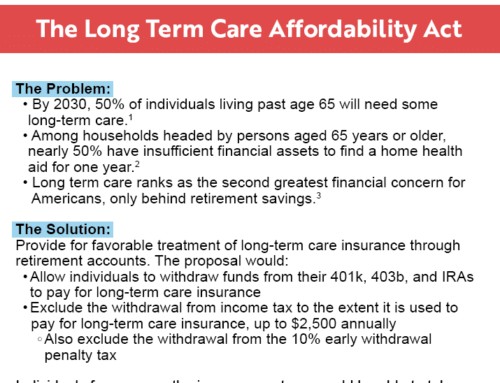
TOP TEN REASONS WHY LONG-TERM CARE INSURANCE IS IMPORTANT
Many people mistakenly believe Long-Term Care Insurance is something they don’t need to worry about until they are much older. Few people try to understand long-term care costs and payment options until it’s a necessary part of their lives and by then, it’s too late. Sadly, some people even assume Medicare or the government will cover this cost. Almost everyone needs Long-Term Care Insurance now regardless of their age.
Reason #1: The need for Long-Term Care can occur at any age
The need for Long-Term Care can happen at any stage in life. It usually occurs when we least expect and it can be financially devastating if someone has not prepared for the possibility.
Non-age-related events such as accidents, strokes, cancer and Alzheimer’s can arise at much younger ages than most people anticipate they will need Long-Term Care.
Reason #2: Your health may change in the future and your ability may decline
Long-Term Care Insurance policies are only available to people who do not currently have pre-existing conditions that make them more likely to need Long-Term Care in the future. For example, a cognitive impairment or diagnosis of ALS.
The longer someone delays enrollment in Long-Term Care Insurance, the more likely they will have a health condition or cognitive impairment that prevents them from being approved.
In this situation, they would have to pay the full costs for their care from their own resources. With the average cost of a Nursing home over $90,000 year this can quickly deplete your savings.
Reason #3: Long-Term Care Insurance premiums increase if you enroll at a later age
Long-Term Care Insurance premiums are calculated based on the age at which you enroll. Premiums for people who sign up in their 70’s are much more expensive than for people who enroll in their 60’s. Accordingly, someone who signs up in their 60’s will pay more than someone who enrolls in their 50’s.
Due to your age and health status – long-term care insurance rates are the most affordable right now!
Reason #4: There is a 70% chance you will need Long-Term Care in the future
According, to the U.S. Department of Health and Human Services 70 percent Americans who turn 65 will need long-term care at some point during the remainder of their lives. If you are married, the odds are very good that at least one of you will need long-term care.
This percentage has been increasing dramatically during the past two decades and is expected to continue to increase. Due to advances in modern medicine – many Americans are surviving health events such as stroke, cancer and heart attacks that previously resulted in a higher death rate. However, these advancements mean people are living longer and needing more assistance.
Reason #5: The high costs of Long-Term Care can financially devastate a well-planned retirement
A recent study indicates that the average lifetime cost of long-term care in retirement tops $250,000. That figure considers that many retirement communities charge annual fees more than $100,000/year, with Alzheimer and dementia care running even higher.
If someone has not prepared by setting aside funds to pay for this either through Long-Term Care Insurance or other funding resources, this high cost can drain most of a person or couple’s retirement savings.
In many unfortunate circumstances, a surviving spouse is left destitute and unable to maintain the same lifestyle they are accustomed to or sadly, they can’t pay their bills due to retirement savings that were redirected to Long-Term Care costs.
Reason #6: Long-Term Care Insurance can prevent you from being a burden to your loved ones
You may assume that if you need long-term care, your family will take care of you. However, if the time comes when you need such care, getting if from your family may not be an option. They may have moved away in the meantime or gained responsibilities that make it impossible for them to properly care for you. Long-Term Care Insurance can provide the resources to pay for your care so that you do not become a financial and emotional burden to your spouse or significant other, your children and other family or loved ones. It’s wise to secure some means of financing your long-term care, in case your family’s situation changes in the future.
Reason #7: Long-Term Care Insurance will allow you to receive the care you need in the setting you choose
Long-Term Care Insurance will allow you to pay for a licensed caregiver to come to your home so you can maintain your independence and lifestyle as much as possible while receiving the care you need.
You can also use your Long-Term Care Insurance benefits to reside in an Assisted Care Facility that provides meals, interaction with others and activities as well as the level of care you need.
Reason #8: Long-Term Care Insurance can preserve your lifelong savings for the purposes you intended
Long-Term Care Insurance can help you to avoid from having to transfer your lifetime savings from the purposes you intended such as; you and your spouse’s well-funded retirement or an inheritance for your kids and grandkids.
You also may intend for your estate to be left to your church, school or a charity of your choice. Having a Long-Term Care Insurance policy can assist in making sure your savings remain for this purpose.
Reason #9: Medicare does not pay for Long Term Care costs, and the state (Medicaid) will only pay after you have used up all your available resources to pay for your care
If you think Medicare will pick up the tab, think again! While Medicare may pay for short-term rehabilitation in a Skilled Nursing Facility for up to 100 days after a hospital stay of three days, it does not pay for Long-Term Care or what is also called Custodial Care.
Medicare defines Custodial Care – as care needed due to a chronic condition, frailty or cognitive impairment for which long-term improvement or recovery is unlikely. It’s important to note, that long-term care costs won’t necessarily be limited to medical care, but could include assistance with basic personal tasks of everyday life such as eating, bathing, dressing, using the toilet, dealing with incontinence or transferring to and from a bed or chair. These activities of daily living often require hiring custodial care.
The state, through its Medicaid program, will only pay for care in a Medicaid nursing home after you have used all your resources to pay for your care. Sharing a room in a Medicaid nursing home is an outcome that should be avoided at all costs.
Reason #10: There may be significant tax savings available for Long-Term Care Insurance premiums
If you pay for your Long-Term Care Insurance premiums yourself and are not self-employed, you can deduct the following amounts in 2017 based on your age and to the extent that your total itemized medical expenses – including Long-Term Care Insurance premiums – exceeds 10 percent of your Adjusted Gross Income.
Age 40 and younger $410
Age 41-50 $770
Age 51-60 $1530
Age 61-70 $4090*
Age 71 -older $5110*
If you are self-employed or pay for your Long-Term Care Insurance premiums from your business, your premiums are tax deductible up to the thresholds listed above without meeting the 10 percent of AGI requirement.
*In 2017, the AGI threshold is 7.5 percent for anyone 65 or older.
You can’t ignore the possibility that you or your spouse may someday need care – and the money to pay for it! To help safeguard your nest egg, it makes sense to prepare a strategy now to address the potential need for long-term care. And the sooner you do, the less stressful it can be. For more information, please call or email.



